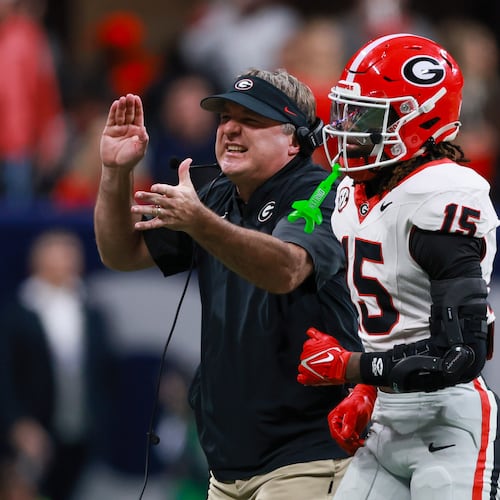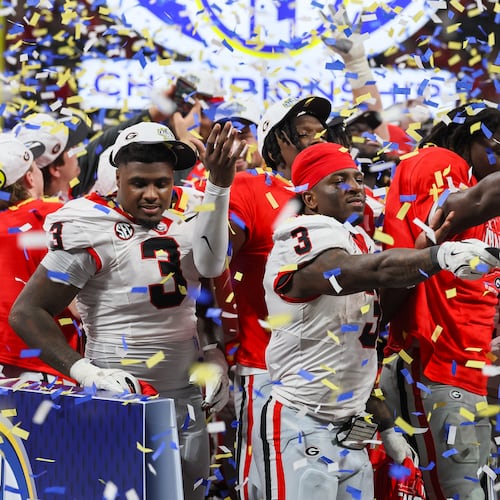It’s a problem beyond Kirby Smart’s control, so you know he won’t spend any time worrying about it. But Georgia and the three other teams that earned byes in the first round could face a challenge not of their own making when they play their College Football Playoff quarterfinal games on New Year’s Eve and New Year’s Day.
When the No. 2 Bulldogs line up against No. 7 seed Notre Dame on the evening of Jan. 1 in the Sugar Bowl, it will have been 25 days since they defeated Texas in the SEC championship at Mercedes-Benz Stadium. The Fighting Irish, meanwhile, will be coming off something akin to an open date in the regular season. The Sugar Bowl will be 12 days after its first-round win over Indiana this past Friday.
For Notre Dame, that would seem the much better end of the bargain. That break allows enough time to get rest and tend to bumps accumulated in the first-round win over Indiana but also not so much time off that players get rusty or lose conditioning.
In his Monday virtual news conference ahead of the Sugar Bowl, Smart acknowledged that having extended time off can affect a team.
“It’s really just hard to manage, hard to deal with, in terms of that space and how you keep your players in shape but in football shape and game shape,” Smart said. “That’s the bigger dilemma. Do you lose rhythm?
“You watch it most times in bowl games. People that have those long breaks, it can affect how you play. and we’re trying our best to manage that.”
That should get the attention of Bulldogs fans. Smart is no worrywart. It’s not every factor of a game that he would acknowledge can affect how a team plays and is “hard to deal with.”
At least on this scale, it’s a new puzzle for teams to solve. In bowl and/or CFP games to this point, teams largely have had equal or near-equal rest. For a Jan. 1 bowl game, for example, a team playing in a conference championship game would have an advantage over a team that last played in the final week of the regular season, but that would be a difference of roughly four weeks vs. five weeks. That is a different comparison than 12 days vs. 25 days.
It’s a little bit like the conversation in Major League Baseball over whether teams that play in the wild-card rounds have an advantage over teams that earn the bye.
Apologies to the subset of Georgia fans who are also Braves fans for introducing something new to agonize over until kickoff.
It will be an element of the four quarterfinal bowl games to watch, one more facet of the 12-game playoff that may have to be worked out as the college football money machine gushes forth its millions.
There may already be some.
The problem-solving geniuses on social media made it easy for everyone with their real-time discoveries of kinks in the system as the first-round games played out. Friday night, the Big Ten was overrated when Indiana lost decisively to Notre Dame. Saturday, Clemson and SMU’s lopsided defeats were evidence enough that the ACC should be permanently banned from not only playing football but possibly watching it.
And, finally, Tennessee getting smashed to pieces by Ohio State was by no means a reflection on the SEC.
Notre Dame did pay a steep price for playing in the first round as defensive tackle Rylie Mills suffered a knee injury that will keep him out for the remainder of the CFP. Mills leads the Irish defense in sacks (7.5) and tackles for loss (8.5). Injury risk is the obvious hazard of playing in the first round (besides the potential to lose).
Regardless, in a game that is pegged to be close — Georgia is favored by 1.5 points but Notre Dame is given a 53.9% probability of winning by ESPN’s metrics — being the sharper team at the start or having an advantage in conditioning could be difference-making.
If Georgia starts slowly and quarterback Gunner Stockton (now the unquestioned starter with the announcement that Carson Beck underwent elbow surgery) has some nerves, it would hardly be a surprise for the Bulldogs to quickly fall behind by two scores. Against a team of Notre Dame’s apparent strength — their schedule to this point still leaves some doubt — that head start could be enough to decide the outcome.
In the meantime, the Bulldogs are doing what they can, which presumably means practices that approximate game conditions as much as possible, something Smart is not averse to.
And, in this case, giving Stockton as much practice time as he can get plays to Georgia’s advantage. Monday, Smart said that Carson Beck and his family “are still going through those deliberations” as they consider treatment options for his injured elbow, but he didn’t do much to counter the notion that Stockton will be starting for the Bulldogs in New Orleans.
“I do think, knowing when you get ready for an opponent like Notre Dame, you need time,” Smart said.
It should be an encouragement to Bulldogs fans that they’ve won seven consecutive bowl or CFP games, an indication that Smart knows something about preparing teams to play in the postseason.
How much will Georgia’s layoff matter? We’ll let the social-media wizards let us know the real answer.
About the Author
Keep Reading
The Latest
Featured



